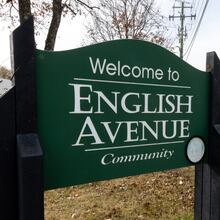A little less than a year on the job leading one of the nation’s largest railroads, Norfolk Southern CEO Alan Shaw has now become practiced at calmly listening as politicians and residents upbraid him for his company’s toxic derailment disaster in East Palestine, Ohio.
Seated at the witness table during a Senate hearing Wednesday, there was little expression betrayed on 55-year-old Shaw’s face, other than a sober seriousness as he pursed his lips and furrowed his brow and recited messages of contrition like a mantra. He’s sorry for what residents affected by the derailment have gone through. He wants to help East Palestine thrive. And, “I am determined to make this right.”
The Atlanta-based railroad has provided tens of millions of dollars in relief funds and other aid to the community, and Shaw has committed to staying as long as it takes to help East Palestine recover.
But seven weeks into the crisis, Shaw and Norfolk Southern have a long way to go in winning over many East Palestine residents and lawmakers. And management experts questioned the company’s response to what Norfolk Southern’s chief financial officer called “a defining moment” for a railroad whose roots date back nearly 200 years.
Railroads are industrial businesses with a low profile and their CEOs are typically little-known to the public. But Norfolk Southern and Shaw have quickly become household names in the last way they would wish for.
The Feb. 3 East Palestine derailment that emitted toxic chemicals into air, soil and water in the surrounding area catapulted Shaw into weeks of criticism and interrogation on Capitol Hill, in a CNN town hall and in numerous other forums.
The company faces a sweeping federal investigation, lawsuits filed by residents and shareholders and a push for more stringent rail safety regulations that railroads have long resisted.
“For decades, the railroads have lobbied to undermine safety rules. They’re still at it even now, after what they’ve done to this Ohio town, even with the eyes of the country on them,” said U.S. Sen. Sherrod Brown, D-Ohio, who has introduced bipartisan safety legislation to tighten rail safety regulations.
At Wednesday’s hearing, senators tried to pin down Shaw about the legislation. Shaw acknowledged a need for improvements but did not endorse the full bipartisan package co-sponsored by Ohio’s senators. He also would not divulge provisions to which he objected.
“We support legislative efforts that use science and data to enhance the safety of the freight rail industry,” Shaw said, who has pledged “to rebuild our safety culture from the ground up.”
Norfolk Southern said it was unable to make Shaw available for an interview with The Atlanta Journal-Constitution for this article.
A Norfolk Southern lifer, Shaw spent 29 years working his way up the ranks to CEO. With degrees in aerospace engineering and business from Virginia Tech, Shaw has led intermodal operations, the chemicals division, coal transportation services and marketing.
Shaw made nearly $4.4 million in total compensation as chief marketing officer in 2021, the most recent figures available. But he likely received a substantial raise in 2022 after taking the top job last May.
During the CNN Town Hall less than three weeks after the derailment, it was apparent the fallout from the derailment has weighed on Shaw.
“I’ve been thinking about this every day, since this has occurred, going over my mind and asking my team, what we could have done differently?” he said. “You know, it’s clear that our safety culture and our investments in safety, didn’t work here to prevent this accident.”
Thrust into the spotlight
When the train braked to a stop at the edge of the small village on a frigid night, it wasn’t immediately clear to the conductors that the train had even derailed, let alone that it would escalate into one of the most troublesome train incidents in recent history. Norfolk Southern issued a brief statement the day after the derailment and opened a family assistance center near the town.
In the initial days, the accident garnered limited national attention. But a build up of internal rail car pressure presented the railroad and first responders with few good options.
To avoid a potential cataclysmic explosion, response teams opted to perform a controlled burn of toxic vinyl chloride.
While no one was killed, the image of a large black smoke plume rising above the town was disturbing and soon went viral, triggering a media storm.
In the week after the derailment, railroad officials issued some updates on their work in the area, but the company kept a lower profile nationally as questions about the impact of the chemicals percolated.
Residents became fearful of the long-term impact of the chemicals and angry at Norfolk Southern, government officials became disenchanted with the company’s response, and the incident’s impact gained attention across the country. Misinformation spread, fueled by social media, causing a lack of trust in officials’ statements.
By Feb. 13, executives found themselves in full-blown crisis mode.
Two days later, Norfolk Southern officials ducked a town hall, citing safety concerns, drawing criticism from Ohio officials.
The following day, Shaw issued a letter about the company’s commitment to East Palestine. He then quietly visited employees and officials in East Palestine the following weekend — but did not hold a public event for all residents of the town, upsetting some who felt he was afraid of being confronted.
Misti Allison, an East Palestine resident who appeared at the Wednesday Senate committee hearing, said in her written testimony that kids were not allowed to play on the playground because it hadn’t been cleaned.
“So the kids now play a game they invented called ‘EVACUATION’ during recess,” she said. “This train derailment has robbed our kids of their childhood, and perhaps more.”
Navigating the crisis
Norfolk Southern is paying for environmental remediation and testing and has donated more than $24 million to area recovery efforts. The company says the commitments are just a start.
But it was a mistake for Shaw to not show up for those early public meetings, said T.J. Winick, author of “Reputation Capital: How to Navigate a Crisis and Protect Your Greatest Asset.” The venting of frustration would be difficult, but it’s “cathartic,” he said.
“Alan Shaw should be on camera walking through the town, talking to people, talking to families,” Winick said. “You should see him crouching down with the people taking soil samples. They need to do a better job of storytelling.”
Whatever the public perception, Shaw is “a good person,” said Ken Alexander, the mayor of Norfolk, Virginia. When the company was headquartered in his city before moving to Atlanta a few years ago, officials were “very open and accessible,” Alexander said.
“He will do the right thing,” Alexander said. “He’s a man of his word.”
Katie Kirkpatrick, president of the Metro Atlanta Chamber, called Shaw, who is a member of the organization’s board, “a leader who listens and responds with compassion,” with “a levelheaded demeanor that brings civility to all of his interactions.”
She added that she thinks his “integrity and willingness to listen has proven to be vital in this challenging time for the company.”
Shaw was questioned by residents of East Palestine at the CNN town hall, some of whom voiced appreciation for his measured demeanor, but others became angry at the company’s treatment of residents.
“You seem like a sincere man; I’m not calling you names,” said lifelong East Palestine resident Jim Stewart. “But your company stinks because they are not watching what’s going on.”
“I understand the anger,” Shaw responded. “I’ve experienced it as I’ve talked to the citizens of this community.”
The frustration lingered. In early March, angry residents crowded another town hall in East Palestine and shouted at Norfolk Southern officials about their concerns, their fears and the need for the company to respond.
‘Cautionary tale’
Norfolk Southern may not have been prepared for the public vitriol “because they are not often used to having to respond to consumer issues,” said LaShonda Eaddy, an assistant professor at Pennsylvania State University’s Donald P. Bellisario College of Communications.
The East Palestine disaster and Norfolk Southern’s response could prove to be “a cautionary tale” for other companies, Eaddy said, as social media and public expectations of corporate social responsibility have raised the stakes.
“Our current climate does require more” because of “how heavily politicized and polarized things are,” she said.
Nearly two months since the crash, the scrutiny isn’t letting up.
The National Transportation Safety Board has announced a special investigation into Norfolk Southern’s safety practices and culture. The Department of Transportation has launched new inspections of railroad tracks and issued an advisory urging railroads to make an array of safety improvements.
And the Ohio Attorney General filed a 58-count civil lawsuit against Norfolk Southern to hold the company financially responsible for the derailment.
In 2022, the company made nearly $3.3 billion on a record $12.7 billion in revenues. One analyst estimates the potential cost to Norfolk Southern of the East Palestine derailment could be $30 million to $50 million, not including potential legal settlements, which could send the tally far higher.
Norfolk Southern contributions after derailment
Through Wednesday, Norfolk Southern says it has committed more than $24 million to East Palestine, Ohio, and the surrounding region.
That includes:
- More than $10 million in financial assistance to families
- A $1 million community assistance fund for East Palestine
- A community liaison with a $1 million budget
- Millions for local fire departments for new or replacement equipment
Norfolk Southern is also planning a long-term medical compensation fund, a property value assurance program and a longer term water testing program.






